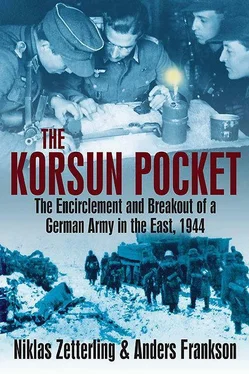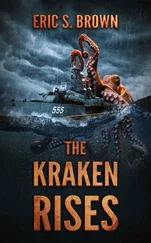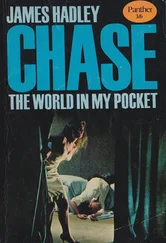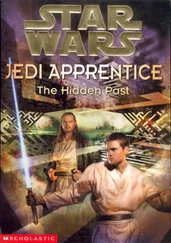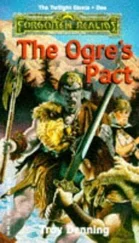On 22 January the XI Corps was engaged in minor actions in the Smela–Beresnyaki region, but these were not major concerns for the corps. In front of the sector held by 389th Infantry Division, intensive Soviet motor traffic, including tanks, was detected in the morning, especially in the Balandino–Krasnosilka area. Later the same day, the 389th Division was attacked south of Balandino, but the attacks were repulsed. Further Soviet movement in the area was observed, and artillery fire was called on to disrupt enemy movements. The commander of XI Corps, General Stemmermann, thought that the Soviet attacks against the corps were intended to feel for weak points, as a preliminary to a major offensive. Aerial reconnaissance indicated that the Red Army was creating a force concentration around Krasnosilka, which confirmed the view put forward by the commander of XI Corps. It was more difficult to establish the direction of a Soviet attack from this staging area, but as a precaution, the 8th Army decided to pull the 11th and 14th Panzer Divisions out of the front, to create a reserve. 51
Soviet traffic in the Balandino–Krasnosilka area continued during the evening, and artillery from the XI Corps engaged Soviet concentrations east of Burtki and Verbovka. The impression of a force build-up was reinforced on 23 January by Soviet employment of antiaircraft units and fighter cover in the Balandino–Bondyevo area. Despite this, the Germans planned air attacks against this area, to disrupt and damage the Soviet build-up. Also, it was discovered that the Red Army had moved reinforcements into the area south of the Balandino–Krasnosilka region. 52
Signs of an imminent attack multiplied during the afternoon of 23 January. Red Army assault units tried to destroy barbed wire and other field works, and Soviet artillery units began registering targets. The Germans responded by calling for artillery fire and air strikes on the Soviet concentrations. At 19.30hrs on 23 January, the 8th Army noted that the assumed Soviet main concentration in the Balandino–Krasnosilka area had been confirmed. Recent observations further suggested that the enemy grouping extended further south, between Krasnosilka and Penkino. 53
Preliminary Soviet Attacks, 24 January
For the Germans, the situation grew even more precarious on 24 January. In the morning, strong Soviet attacks hit the 389th Infantry Division. It was stretched thin, with a combat strength of 1,500 men spread over a sector of 21 kilometers. To remedy the situation, a small armored group from the SS-Wiking Division counterattacked near Burtki, but the results were mixed. Still, the Germans were not entirely clear about where the Soviet main effort would be directed. The attacks on 389th Division were so far made without tank support and seemed like an effort to improve positions and gain knowledge of German dispositions as a prelude to the main assault. 54
Anton Meiser served as an NCO in the artillery regiment of the 389th Division. His battery was deployed further north, near Olyanino, when shortly after 10.00hrs General Kruse, the division’s commander, arrived. Meiser climbed aboard Kruse’s vehicle and the driver set out for an observation post for the artillery. When they reached the position, which Meiser had visited previously, he could not avoid being awed by the change. Recent combat had completely changed the landscape, and the snow was “burned” and showered with earth. Meiser had little time to contemplate the landscape however, as he quickly had to make everything ready to repel a forthcoming Soviet attack. 55
He did not have to wait long before Katyusha rocket launchers (known as “Stalin organs”), mortars, and howitzers opened a murderous fire. Meiser called for fire from his tubes in response. Only a few rounds were expended, but they were sufficient to see that the fire was correctly aimed. Suddenly the Soviet weapons went silent and Soviet infantry stormed forward. First it appeared to Meiser that the German infantry froze in fear, but very soon the characteristic sound of rapid-firing MG42 machine guns was heard. Cries of pain were mixed with “Urrah” yells. Meiser wasted no time and directed his artillery to fire a barrage at the attacking Soviet troops. Under the impact of the exploding shells the assault came to a halt. The Soviet troops withdrew, but the terrain offered no cover, and the retreat became costly. 56
Major-General Kruse was satisfied that the Soviet attack had been repelled, but he could not understand why such a significant attack had not been detected earlier. Meiser replied that he had seen signs of the coming attack, and sent the information to his battalion commander, who had rejected the threat. Kruse and Meiser had hardly begun discussing the issue when Soviet heavy weapons again opened fire. In their optics, both men could discern Soviet infantry advancing. At this moment a runner arrived with the bad news that the artillery batteries on the right had depleted their ammunition. Thus the attacking Soviet infantry was permitted to overrun the defenses of a German battalion, and motorized troops were following behind. 57
At first Kruse tried to order tanks to the threatened area, but they were halted as Soviet antitank guns engaged them. Instead he turned to Meiser and ordered him to call down artillery fire. Meiser immediately turned to his business and used a hurriedly improvised solution to direct the guns of the battery to various targets. Behind him, Kruse seemed to be somewhat startled, but allowed Meiser to do everything in his own way. When Kruse saw that it worked smoothly and had produced the desired results, he said “My son, that is not how it is written in any field manual, but it is good! Excellent, continue!” 58
The artillery fire put the Soviet antitank guns out of action and the German tanks that had been stalled continued to try to recapture the contested hill. However, the battery Meiser directed was also running short of ammunition. Fortunately for the hard-pressed German infantry, a Stuka attack was on the way, as reported on the radio receiver in Kruse’s vehicle. Hardly had Kruse received the message before intense Soviet fire, from every conceivable weapon, rained down on the German positions. Meiser called for a barrage, but it was weak and soon ended when the ammunition was expended. The Russian infantry continued forward, only to be attacked by the Stukas in the nick of time. 59

Kruse and Meiser rejoiced when they saw the aircraft, which effectively created havoc among the advancing Soviet units. After their initial effort the Stukas turned and came back for a second attack. This time, however, they made a serious mistake in attacking their own defending troops. Kruse ordered Meiser to fire a star shell to indicate that the position was held by German troops, but Meiser had none remaining. The aircraft made their attack and departed. Soviet infantry wasted no time and resumed their advance when they saw the German aircraft attacking their own infantry. 60
The depleted German infantry, disrupted by the attack from its own air force, could not resist the Soviet assault. Soon some soldiers began running back. Kruse gave orders to break up and he set off toward his vehicle, to try to direct the tanks to counterattack where the infantry gave way. The Red Army soldiers followed the retreating Germans, but to Meiser it appeared that they did not follow very quickly; he thought that perhaps they were just as exhausted as the Germans. 61
The battalion commander of the recoiling German infantry ordered his soldiers to hold and take new positions, but to no avail. None obeyed his orders. Meiser shouted: “Herr Major, something has to be done. If Ivan reaches the hilltop, he will see our howitzers as if they were a gift served on a plate.” The major reacted and told Meiser to help him. The major, as well as a sergeant, pulled their pistols and pointed them at the fleeing soldiers, shouting, “Get into position or I will shoot you!” Meiser believed that the major or the sergeant, both very nice men, would never have shot their own soldiers, but fortunately they did not have to. The fleeing soldiers halted, got down and began firing at the approaching Soviet infantry. Some sort of defense was restored and the Soviet onslaught was temporarily checked. While these dramatic events took place Kruse had tried to get armor support to the endangered area. The time won when the major got his men to halt the Soviet advance was sufficient to allow the armor to counterattack and stabilize that sector of the front. By the evening, the Germans had mastered the difficult situation and the fighting slowed down. But though Kruse had managed to scramble a defense together, further south it was ominously quiet. 62
Читать дальше
